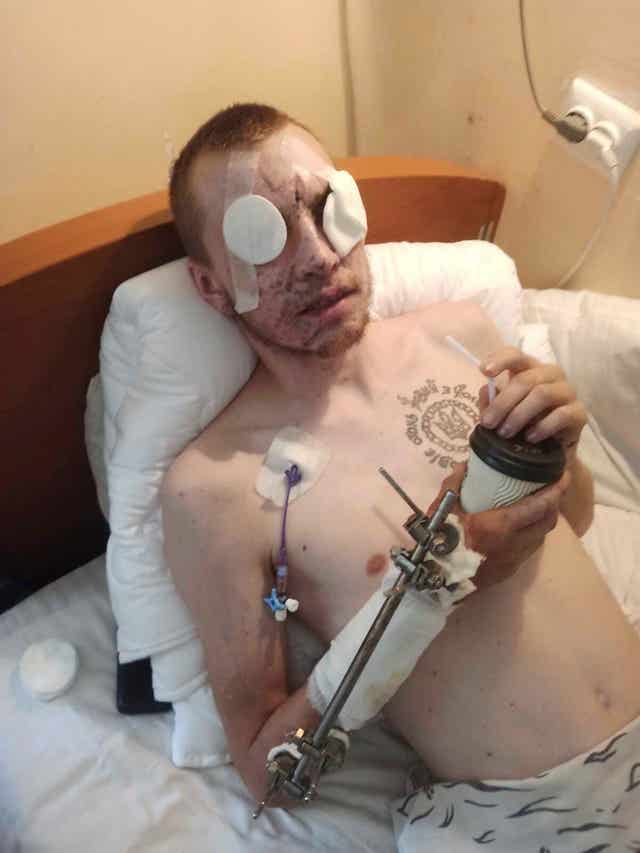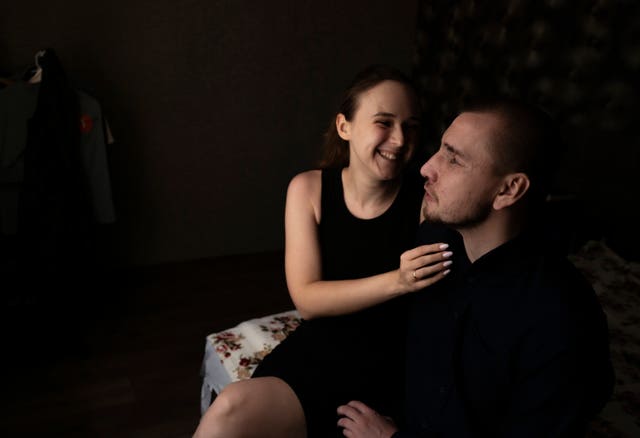Village celebrates wedding of blinded Ukrainian soldier
Ivan Soroka lost his sight after he was hit by shrapnel during fighting in Bakhmut.

After being blinded by a Russian mortar shell, Ukrainian veteran Ivan Soroka could not see his bride when she walked into his family home in a shoulderless white dress, with a bouquet of white flowers in her hand.
But when Vladislava Ryabets, 25, stepped toward him, Mr Soroka wept with joy at the new chapter of life starting months after enemy artillery stole his sight.
“The first thing I said after I was wounded was: who will want me now?” said Mr Soroka, 27, sitting inside his family home in a village in the outskirts of Kyiv.
“I succeeded in rebuilding myself,” he said. “I am seeing with my feelings, with my emotions.”

Folk songs and laughter filled the air as neighbours and friends toasted the young newlyweds.
The Associated Press first met Mr Soroka at a rehabilitation camp for ex-soldiers who lost their vision in combat. The courtship was not unusual in wartime Ukraine. Throughout the capital, young men with prostheses hold hands with their partners and family members.
Many couples have fleeting encounters between rare visits home from the front line.
Spouses sometimes travel to cities near combat areas to see their loved ones for a few hours between time fighting. The onset of Russia’s invasion also saw a surge in marriages, as many came to realise the future would be uncertain, and possibly cut short.

“Thank God he has this golden woman in his life,” she said.
Mr Soroka and Ms Ryabets met online on April 6 2022, less than two months after Russia’s full-scale invasion of Ukraine.
Mr Soroka was recovering from pneumonia at a military hospital. He logged into a dating app and saw Ms Ryabets’ profile photo.
He was ambitious and driven. She was patient and graceful, working with autistic children in a clinic.
Only six weeks after they met, they were having a coffee together during one of Mr Soroka’s short leaves from the front when Mr Soroka proposed. But his unit was moved to Bakhmut in the Donetsk region for the war’s longest and bloodiest battle.
On August 2, near the village of Horlivka, his unit received an order to withdraw to reserve positions because their section of the front line had been destroyed.

The wounded soldier’s phone was punctured and shattered by the blast wave – meaning Ms Ryabets could not reach Mr Soroka.
In hospital, a nurse helped him retrieve his SIM and he was able to open messages and get back in touch with his fiancee.
At the hospital in Vinnytsia, Mr Soroka was barely recognisable. Ms Ryabets visited him every weekend until he was discharged nearly a year ago. They had hoped his eyes would heal and his sight would return.
It never did, but Ms Ryabets never wavered.
“Nothing changed for me,” she said.
Mr Soroka is determined to move forward, he said. He hopes to find work, and most of all, he hopes for a first child.





